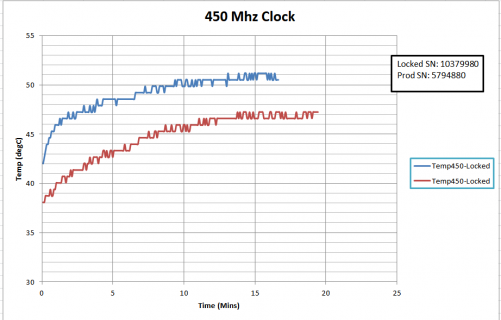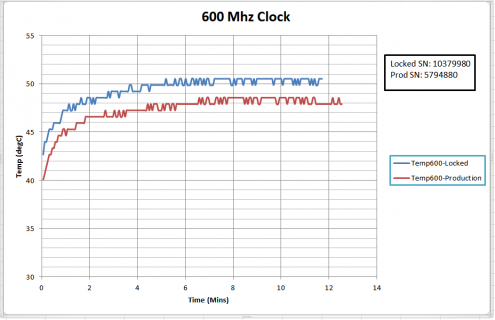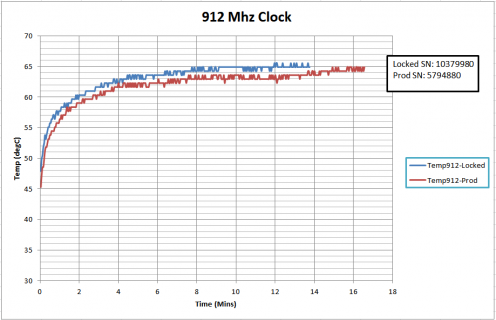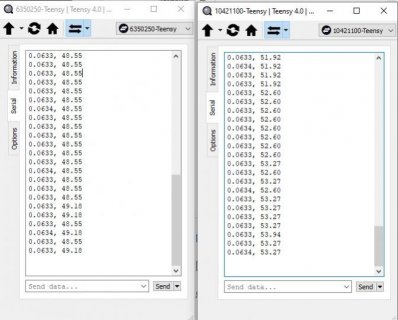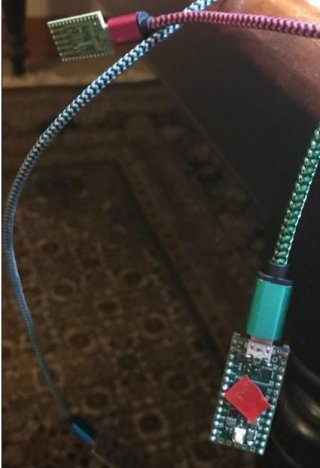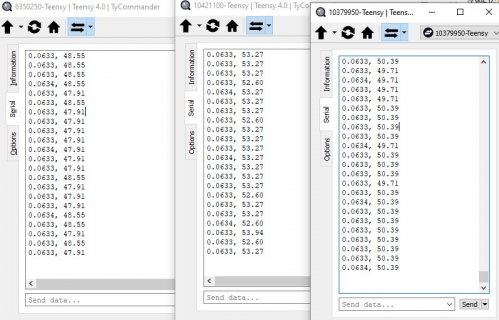// https://forum.pjrc.com/threads/33443-How-to-display-free-ram
#include <MemoryHexDump.h> // https://github.com/KurtE/MemoryHexDump
long time_now;
uint32_t *ptrFreeITCM; // Set to Usable ITCM free RAM
uint32_t sizeofFreeITCM; // sizeof free RAM in uint32_t units.
extern unsigned long _stextload;
extern char _stext[], _etext[], _sbss[], _ebss[], _sdata[], _edata[],
_estack[], _heap_start[], _heap_end[], _itcm_block_count[], *__brkval;
float myTemp;
//Prime number calculator: https://www.educba.com/prime-number-in-c-plus-plus/
int flag;
int lower_init = 2;
int higher = 100000;
void setup()
{
// put your setup code here, to run once:
Serial.begin(115200);
while (!Serial);
if ( CrashReport) Serial.print( CrashReport);
Serial.println("\n" __FILE__ " " __DATE__ " " __TIME__);
if ( CrashReport ) Serial.print ( CrashReport );
myTemp = tempmonGetTemp();
Serial.printf( "\n\tdeg C=%f\t F_CPU=%u\n" , myTemp, F_CPU_ACTUAL );
memInfo();
getFreeITCM();
extern const uint32_t hab_csf[768]; // placeholder for HAB signature
Serial.println();
//dumpRam(Serial, 0x60000000 + ptrFreeITCM - 1024, 1024);
// Serial.println((uint32_t)&_stextload + (uint32_t)&_etext, HEX);
MemoryHexDump(Serial, hab_csf , 128, true, "---\thab_csf\n");
MemoryHexDump(Serial, ptrFreeITCM - 1024, 128, true, "---\tITCM used\n");
MemoryHexDump(Serial, ptrFreeITCM, sizeofFreeITCM * sizeof(uint32_t), true, "---\tITCM filler to DTCM\t test 3 \n");
MemoryHexDump(Serial, (uint8_t *)0, 128, true, " ITCM Start: \n");
isEncrypt();
}
void loop() {
int lower = lower_init;
time_now = millis();
while ( lower < higher)
{
flag = 0;
for ( int x = 2; x <= lower/2; ++x)
{
if ( lower % x == 0)
{
flag = 1;
break;
}
}
//if ( flag == 0){
// Serial.printf("%d ", lower);
//}
++lower;
}
//Serial.println();
Serial.print((millis()-time_now)*0.00001667,4);Serial.print(", ");
Serial.println(tempmonGetTemp(),2);
}
#define printf Serial.printf
void memInfo () {
constexpr auto RAM_BASE = 0x2020'0000;
constexpr auto RAM_SIZE = 512 << 10;
constexpr auto FLASH_BASE = 0x6000'0000;
#if ARDUINO_TEENSY40
constexpr auto FLASH_SIZE = 2 << 20;
#elif ARDUINO_TEENSY41
constexpr auto FLASH_SIZE = 8 << 20;
#else
constexpr auto FLASH_SIZE = 16 << 20;
#endif
// note: these values are defined by the linker, they are not valid memory
// locations in all cases - by defining them as arrays, the C++ compiler
// will use the address of these definitions - it's a big hack, but there's
// really no clean way to get at linker-defined symbols from the .ld file
auto sp = (char*) __builtin_frame_address(0);
printf("_stext %08x\n", _stext);
printf("_etext %08x +%db\n", _etext, _etext - _stext);
printf("_sdata %08x\n", _sdata);
printf("_edata %08x +%db\n", _edata, _edata - _sdata);
printf("_sbss %08x\n", _sbss);
printf("_ebss %08x +%db\n", _ebss, _ebss - _sbss);
printf("curr stack %08x +%db\n", sp, sp - _ebss);
printf("_estack %08x +%db\n", _estack, _estack - sp);
printf("_heap_start %08x\n", _heap_start);
printf("__brkval %08x +%db\n", __brkval, __brkval - _heap_start);
printf("_heap_end %08x +%db\n", _heap_end, _heap_end - __brkval);
#if ARDUINO_TEENSY41
extern char _extram_start[], _extram_end[], *__brkval;
printf("_extram_start %08x\n", _extram_start);
printf("_extram_end %08x +%db\n", _extram_end,
_extram_end - _extram_start);
#endif
printf("\n");
printf("<ITCM> %08x .. %08x\n",
_stext, _stext + ((int) _itcm_block_count << 15) - 1);
printf("<DTCM> %08x .. %08x\n",
_sdata, _estack - 1);
printf("<RAM> %08x .. %08x\n",
RAM_BASE, RAM_BASE + RAM_SIZE - 1);
printf("<FLASH> %08x .. %08x\n",
FLASH_BASE, FLASH_BASE + FLASH_SIZE - 1);
#if ARDUINO_TEENSY41
extern uint8_t external_psram_size;
if (external_psram_size > 0)
printf("<PSRAM> %08x .. %08x\n",
_extram_start, _extram_start + (external_psram_size << 20) - 1);
#endif
printf("\n");
auto stack = sp - _ebss;
printf("avail STACK % 8d b % 5d kb\t<<RAM1\n", stack, stack >> 10);
auto heap = _heap_end - __brkval;
printf("avail HEAP % 8d b % 5d kb\t<<RAM2\n", heap, heap >> 10);
#if ARDUINO_TEENSY41
auto psram = _extram_start + (external_psram_size << 20) - _extram_end;
printf("avail PSRAM % 8d b % 5d kb\n", psram, psram >> 10);
#endif
}
uint32_t SizeLeft_etext;
FLASHMEM
void getFreeITCM() { // end of CODE ITCM, skip full 32 bits
Serial.println("\n\n++++++++++++++++++++++");
SizeLeft_etext = (32 * 1024) - (((uint32_t)&_etext - (uint32_t)&_stext) % (32 * 1024));
sizeofFreeITCM = SizeLeft_etext - 4;
sizeofFreeITCM /= sizeof(ptrFreeITCM[0]);
ptrFreeITCM = (uint32_t *) ( (uint32_t)&_stext + (uint32_t)&_etext + 4 );
printf( "Size of Free ITCM in Bytes = % u\n", sizeofFreeITCM * sizeof(ptrFreeITCM[0]) );
printf( "Start of Free ITCM = % u [ % X] \n", ptrFreeITCM, ptrFreeITCM);
printf( "End of Free ITCM = % u [ % X] \n", ptrFreeITCM + sizeofFreeITCM, ptrFreeITCM + sizeofFreeITCM);
for ( uint ii = 0; ii < sizeofFreeITCM; ii++) ptrFreeITCM[ii] = 1;
uint jj = 0;
for ( uint ii = 0; ii < sizeofFreeITCM; ii++) jj += ptrFreeITCM[ii];
printf( "ITCM DWORD cnt = % u [#bytes=%u] \n", jj, jj * 4);
}
// https://forum.pjrc.com/threads/33443-How-to-display-free-ram?p=275013&viewfull=1#post275013
extern char *__brkval;
int freeram() {
return _heap_end - __brkval;
}
PROGMEM char title_text[] = "Verify secure code is running properly";
FLASHMEM void title_function() {
Serial.println( title_text );
Serial.println();
}
//extern "C" uint32_t _sdata, _edata, _sdataload; /* special linker symbols */
extern "C" uint32_t _sdataload; /* special linker symbols */
extern const uint32_t hab_csf[768]; // placeholder for HAB signature
int isEncrypt() {
int ok=0;
title_function();
if ((IOMUXC_GPR_GPR11 & 0x100) == 0x100) {
Serial.println("Pass: Bus Encryption Engine is active");
} else {
Serial.println("Fail: Bus Encryption Engine is not active");
ok--;
}
uint32_t begin_address = IOMUXC_GPR_GPR18 & ~0x3FF;
if (begin_address == 0x60001400) {
Serial.println("Pass: Encryption region starts at proper address");
} else {
Serial.println("Fail: Encryption region starts at wrong address");
ok--;
}
uint32_t end_address = IOMUXC_GPR_GPR19 & ~0x3FF;
uint32_t data_end = (uint32_t)&_sdataload + (uint32_t)&_edata - (uint32_t)&_sdata;
if (data_end <= end_address) {
Serial.println("Pass: Program data is entirely within encrypted region");
} else {
Serial.println("Fail: Program data is not within encrypted region");
ok--;
}
uint32_t title_address = ((uint32_t)&title_function) & ~1;
if (title_address >= begin_address && title_address < end_address) {
Serial.println("Pass: title_function() is within encrypted region");
} else {
Serial.println("Fail: title_function() is not in encrypted region");
ok--;
}
if ((uint32_t)title_text >= begin_address && (uint32_t)title_text < end_address) {
Serial.println("Pass: title_text[] is within encrypted region");
} else {
Serial.println("Fail: title_text[] is not in encrypted region");
ok--;
}
uint jj = 0;
for ( uint ii = 0; ii < sizeof(hab_csf) / sizeof(hab_csf[0]); ii++ ) jj += hab_csf[ii];
if ( jj ) {
Serial.println("Pass: csf not Zero");
} else {
Serial.println("Fail: csf is Zero");
ok--;
}
// TODO: check HAB version and HAB logfile status
Serial.println();
if (0==ok) Serial.println("All Tests Passed. :-)");
else printf(" %d Tests failed. :-(", -ok);
return ok;
}


